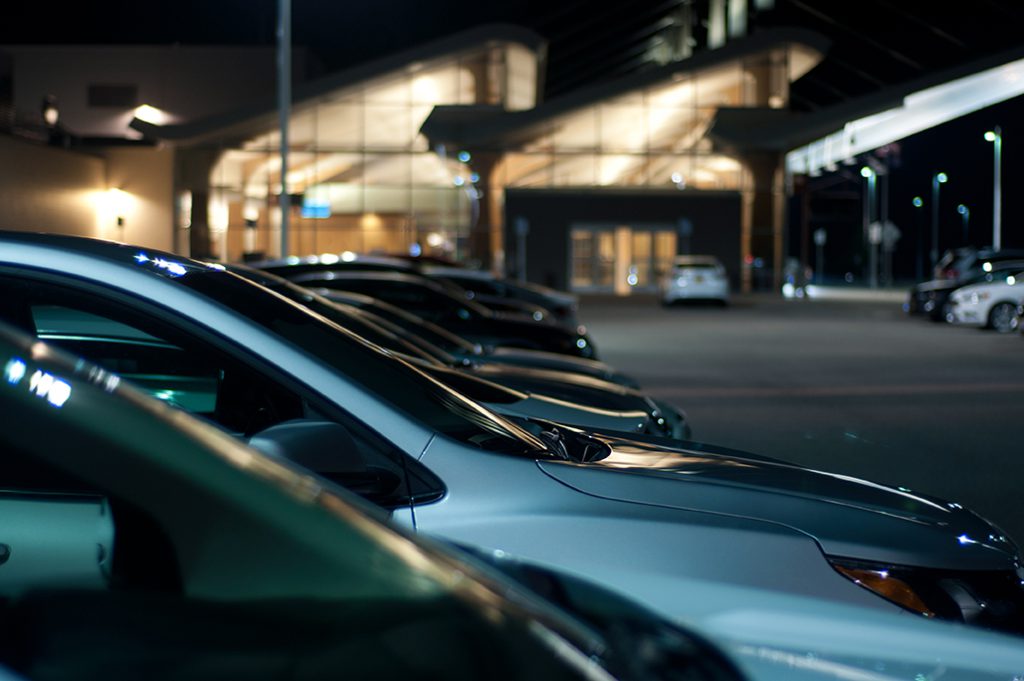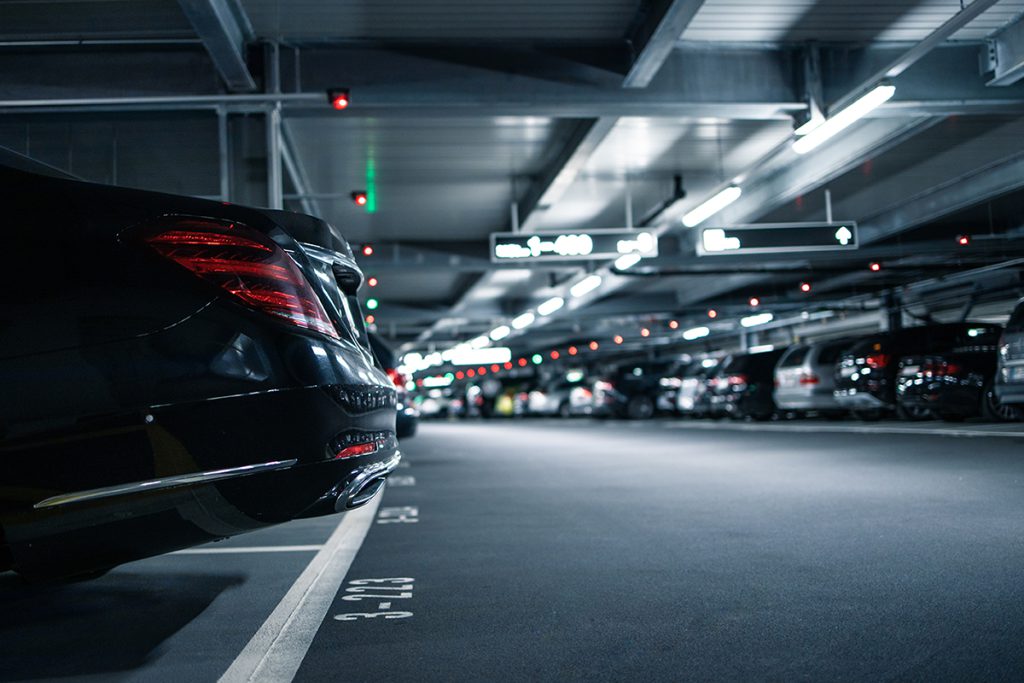Where Should You Park Your Vehicle at Night?

Finding somewhere to park can be tricky at the best of times. But when darkness falls, a parking location that’s both safe and secure is more important than ever. So where should you park your vehicle at night? And what rules apply to parking after dark?
We’re going to take a look at the different parking options, and their pros and cons. And we’ll also look at the all-important question of how where you leave your car can affect your insurance.
Where is the safest place to park your vehicle at night?
There’s no doubt that the risk of crime increases when darkness falls. In the year ending March 2020, no less than 80 per cent of vehicle-related thefts took place in the evening or at night.
So where should you park your vehicle at night to keep it secure?
Finding somewhere that makes things as difficult as possible for thieves is a sensible precaution. That could mean somewhere it’s challenging for them to access. But it could also mean somewhere it’s difficult for them to carry out their theft unobserved.
And it’s worth remembering that crime isn’t the only risk that increases at night. The lower light levels lessen visibility. That also means that accidental damage from other road users, whether vehicles or pedestrians, is more likely too.
Where do you keep the car at night – drive, garage or street?
A lockable garage is a very good option. Not only does it provide an extra barrier to entry, it makes it difficult or impossible for thieves to see your vehicle in the first place. That effectively puts it out of the reach of opportunistic criminals.
If you don’t have a garage, a car park with CCTV or other security measures is a good alternative.
In the UK, the Park Mark scheme is a police crime prevention initiative designed to address vehicle crime. The mark is awarded to parking facilities that have passed a risk assessment by the police. There are more than 5,000 accredited car parks around the country.
But if you don’t have a garage or a suitable nearby car park, houses with their own drives have an advantage. Leaving your car on your own property means it’s close enough to monitor easily. And it also keeps it out of the way of passing vehicles who could knock it in the dark.
But if your only option is on-street parking, you’re far from alone. Try to find a space as close to your home as possible where you can monitor your car more easily. That also means you’re more likely to hear it if an alarm is triggered.
Parking securely on the street
If you’re parking on the street at night, there are other factors to think about too.
People generally feel safer with good street lighting. But research suggests that this can be a double-edged sword when it comes to vehicle crime.
A study carried out in 2022 found that all-night lighting could actually increase the risk of theft from vehicles. On streets where lighting was switched off between midnight and 5am, the rate of car break-ins halved.
And the research suggested that some of that crime was displaced to nearby streets with all-night lighting. In those locations, there was a concurrent 150 per cent increase in thefts from cars.
There could be a number of explanations for this.
Thefts from cars (as opposed to thefts of cars) tend to be opportunistic. In other words, a thief sees something of value in or on the vehicle, and takes the chance to pinch it.
In streets without lighting, seeing those features in the first place becomes more difficult. And it’s harder for a thief to see what they’re doing when trying to remove valuable parts like hubcaps and catalytic converters.
All that means that parking in a well-lit street isn’t necessarily the secure option you’d expect.
And leaving your car in a busier street could also have advantages over a quieter location. A quieter spot might have less chance of thieves passing by. But a location with lots of footfall could also act as a deterrent, with thieves fearing being seen.
How should you park your car at night?

The Highway Code sets out a number of rules about parking at night. They cover where you can park, in what direction, and whether or not you need lights.
You must not park any vehicle facing in the opposite direction to the traffic flow at night. The only exception to this is if you are in a recognised parking space.
And if parking on a road with a speed limit of more than 30 miles per hour, you must use parking lights. (These are your sidelights, the ones you use when it’s getting dark but not yet dark enough for your headlights.)
The other rules are different depending on how big the vehicle you’re driving is. If you’re in a car, you won’t need to use parking lights if:
you’re parking on a road with a speed limit of 30 miles per hour or lower andyou’re parked safely. That means you’re in a recognised parking place or lay-by. Or if not, your vehicle is at least 10 metres from any junction, close to the kerb, and facing the traffic flow.
Where can you park large vehicles at night without using parking lights?
For goods vehicles with an unladen weight of 1,525 kilograms or less, the rules about parking at night are the same as for cars. You won’t need parking lights if you’re on a road with a speed limit of 30 miles per hour, and if you’re parked safely.
But remember, there’s a specific definition of what counts as “safe”. You need to be in a recognised parking space or lay-by. And if there isn’t one of those, you need to be at least 10 metres from a junction, tucked in close to the kerb, and facing the traffic flow.
But for vehicles weighing over 1,525 kilograms unladen, the rules are tighter. You must not park anywhere on any road without parking lights.
If you’re going to be parked up for a long time, leaving your sidelights on will drain your battery. So, for larger vehicles, staying parked all night on the street isn’t a realistic option. You’ll need to find a suitable car park instead.
Off-road lorry or coach parks are designed for exactly this purpose. And they’ll usually have good security measures in place too.
Parking and insurance
Your parking location is one of a number of factors that will affect your car insurance premiums. And most insurers will want to know where you usually park both during the day and at night.
So where should you park your vehicle at night to keep your premiums as low as possible?
Parking your car off-road will reduce the risk to your vehicle. That means lower premiums. And there can be an especially big reduction for performance cars.
In most cases, secure car parks score highly with insurers. The same goes for private driveways, particularly if they have extra security measures like CCTV.
Lockable garages are good too, although they don’t automatically mean low premiums. That’s because the benefit of higher security is partly offset by the risk of scraping your car as you drive in and out.
Note too that if you say you have a lockable garage, your insurance will likely be valid only if it’s locked overnight. Some insurers even ask that your car is inside the garage between certain hours.
What else can you do to secure your vehicle?
All this is fine if you’re lucky enough to have access to suitable off-road parking. But what if you live somewhere where parking overnight on the street is the only option?
There are lots of other options for helping to keep your vehicle secure. Audible alarms, tracking devices and immobilisers can all make a huge difference.
Some of these may already be installed on your car, so make sure your insurer is aware of them. In other cases, you might want to add or upgrade existing security measures. Motorhomes, in particular, often come with only basic security features.
Reducing the risk of accidental damage while parking can also help reduce your insurance premiums.
If your vehicle doesn’t have them already, consider installing parking sensors. They significantly reduce the risk of bumps and scrapes while parking. And that can have a knock-on effect for the cost of insurance.
Parking safely and securely at night
So, to help keep your vehicle secure at night, where should you park?
Off-road is best. Secure car parks or driveways with extra security like CCTV are ideal. Lockable garages are good too. But the risk of bumps when you move your car means the insurance savings might not be as big as you’d imagine.
If on-street parking is your only option, try to park close to home. Extra security measures, like an immobiliser or upgraded alarm system, can deter thieves. And they can reduce your insurance premiums into a bargain.
Also read:
Safe driving at night
Do parking tickets affect insurance?
What kind of modifications affect car insurance?
20 ways to reduce your van insurance premiums in 2022



